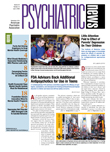Depression is too often a family affair and ought to be viewed that way, but the unsystematic nature of the U.S. health care system serves as a major block to identifying and treating millions of parents whose depression may affect their children's future, according to a report from the National Research Council and the Institute of Medicine.
“[P]arental depression is prevalent, but a comprehensive strategy to treat the depressed adults and prevent problems in the children in their care is absent,” said the report from a task force chaired by Mary Jane England, M.D., president of Regis College in Weston, Mass., and a former president of APA. She spoke at a press conference in Washington, D.C., last month announcing the study's results.
The report estimates that there are 7.5 million parents with depression in the United States caring for 16 million children under age 18.
Depression is usually addressed as a disorder in individuals, but when that individual is a parent, it can affect other family members as well. Parental depression can result in a withdrawn, detached parenting style that interferes with attachment and harms the child's physical, psychological, and social development. It can also disrupt the structure and routine that provide a framework for young lives and is associated with poorer physical health in children. Depression is often accompanied by other physical or psychological comorbidities, most prominently anxiety or substance abuse, often worsening outcomes for affected families, said England.
“We need to think about depressed parents as parents first and then as depressed people,” added panel member William Beardslee, M.D., academic chair in the Department of Psychiatry at Children's Hospital Boston and the Gardner/Monks Professor of Child Psychiatry at Harvard Medical School. Current approaches to depression focus too narrowly on symptoms and diagnoses in individuals while ignoring broader effects on families. Existing screening, treatment, and research protocols, for instance, do not take into account the possibility that the patient is a parent.
The problem has received less attention than it should because it falls along the boundaries of professional and policy domains, from research to payment for services.
“There is remarkably little systematic examination of depression in parents,” said the report. Research and attention usually focus on mothers, with little data available on fathers. Women are screened during pregnancy and shortly following birth, but seldom beyond that point, due to inadequate guidelines or insurance limitations involving cut-off points for reimbursing the physician. Numerous barriers to care stand in the way of screening, access, treatment, and reimbursement.
The remedy lies in comprehensive, multigenerational, family-centered care that will not only identify and treat parents with depression, but also help them improve their parenting skills, and provide support for their children, England said.
For a start, the U.S. Surgeon General should encourage federal health agencies to increase their recognition of depression in parents and its effects on children's development, along with collaborative research into risk and protective factors and, ultimately, demonstration projects to evaluate innovative services.
The Substance Abuse and Mental Health Services Administration and the Health Resources and Services Administration should develop collaborative training programs for primary, mental health, and substance abuse professionals to break down the silos that isolate professional groups.
Payment rules for both public and private payers should be changed to permit care in nonclinical settings (such as home visits or community centers) and eliminate current restrictions in Medicaid that prohibit same-day visits for mental health and primary care services.
Impeding use of Medicaid for this group are “low reimbursement rates, lack of benefit coverage to assess for maternal depression, prohibitions against pediatricians assess[ing] parents, and a restricted range of eligible providers....”
The prospect of achieving such widespread change is daunting, even for members of the IOM committee. “We know what we should do, but we don't know how to implement it,” said Beardslee in a follow-up interview.“ We need a broad public-health approach. However, there will be a real payoff because medical outcomes are worse in people with depression, so there ought to be an incentive to identify and treat family members.”
“Depression in Parents, Parenting, and Children: Opportunities to Improve Identification, Treatment, and Prevention” is posted at<www.bocyf.org/parental_depression_brief.pdf>.▪
